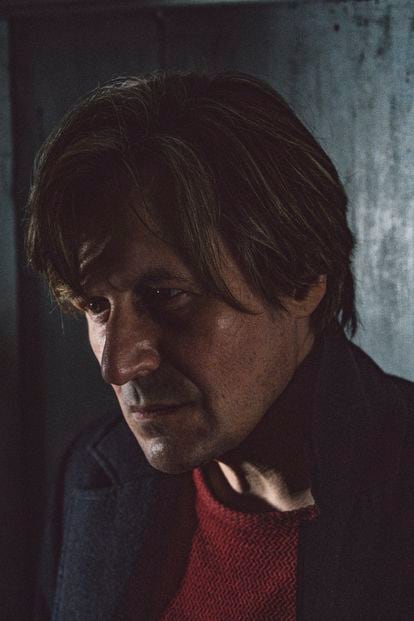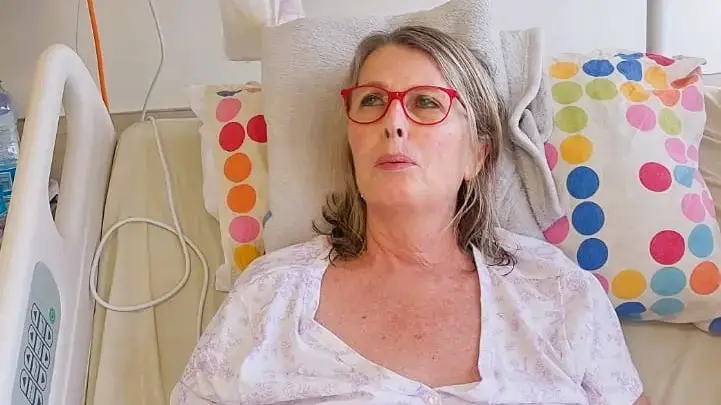The waves crash against the rocks and the seagulls fly over, leaving their murmur uncertain while Nacho Vegas observes the horizon absorbed as if, from there, he could find a pearl deep in the Cantabrian Sea. A few meters away, at the beginning of the rocky path of the port, a sign warned: "Danger due to surges." The sea does not seem rough and the only three boats with permission to fish in Ortiguera rest docked. There is no fear of shocks, although everything can change when the tide rises and a storm threatens. Motionless, with her coat collar turned up and her chestnut fringe blowing in the wind, Vegas stands on the edge of the narrow jetty harbor. As he will explain hours later, but also as he tells in the stark songs of his new album,
Still worlds collapsing
, knows of surges of waves. When he arrived in this small fishing village last April, fleeing his native Gijón, he had been the victim of one. One more time. Loneliness swept him away. Only, this time, he believed he could never get over it again. In fact, even today, he wonders if he's really going to get over it.
Vegas walks slowly through the alleys of Ortiguera, an Asturian town in the council of Coaña, where the first settlers settled their houses on cliffs to be as close as possible to the beach and better serve the fishermen's boats. There was a time, in the middle of the 20th century, when barnacle fishing was an important industrial activity in this area so close to Puerto de Vega and Navia. In the El Ribeiro cetarea, the beautiful canyoned port of Ortiguera, there was a great activity every day to see the freshly brought fish from the sea. Now, it only happens on weekends, almost in a symbolic way. The town barely reaches 500 inhabitants and between its huge stone walls, dyed in green vegetation, hang houses of all colors and shapes. One of them,near the recently remodeled San Agustín lighthouse, was the one that Nacho Vegas inhabited. "I had never been forced to leave Gijón, but this time there was something oppressive about staying there," he confesses.
Houses built on the rocks with views of the sea in the town of Ortiguera, in the council of Coaña Diego Sánchez and Borja Larrondo (The Kids Are Right)
It was January 2021 and the house was falling on him.
The house is his apartment in the center of Gijón, where the musician spent confinement alone and where he has lived for many years without company because he did not give up his piece of independence.
"That square meter of land that is quite a lot", as Vegas recalls, citing the famous song by Vainica Doble.
The hardest and most restrictive part of the pandemic passed more or less well in the spring of 2020, even though it came just after the end of the
Violética tour.
and with the need to reposition himself after the definitive separation with his group, an entity already of its own and with a strong artistic impact that has become León Benavente. However, like so many, he did not see the wave coming, that "unknown loneliness" that grew and ended up overtaking him at the turn of the year, driven by "the pandemic host." "Many of us were not aware of the seriousness of the host until 2021. All my people around had problems: sick leave, very complicated jobs, depressions ... there was even some suicide," he explains. “I felt a new dimension of sadness. Because before I could be screwed, but outside there was life and you took refuge in it. But what was outside was a ghost town. " One afternoon in early January, one of those leaden, gray and heavy, claustrophobia finally seized him. "For the first time,I couldn't be at home and it was heavy for me to write about my own loneliness. I thought: 'I'm 46 years old, I destroyed all my relationships, I don't have a dog and I only know how to make songs and now it seems that not even that. What the hell have I done with my life. " Somehow, he feared that his square meter would become "a grave." He needed to flee. Leave the ghost town. And he went to Ortiguera, 110 kilometers from Gijón on the way to Galicia.
From the Ortiguera house there are spectacular views of the Cantabrian Sea. Vegas rented it to Roland Bourgeois, a Belgian who has spent six decades vacationing in the town since his parents discovered this coastal enclave on the Camino de Santiago in 1961, which has sea to the left and right, thanks to the fact that the Navia beach crosses area. The musician came up with the only idea of writing songs that would allow him to combat his depression, although he was not very confident that it would turn out well. "I was in
shock
. If I returned without songs from this retreat, I had decided that I would go to the doctor to treat my sadness, "he confesses. In fact, it did not install itself. "I didn't dare," he acknowledges. He was accompanied by Juan Ablanedo, his friend since he was 17 years old, from the times when they played in Eliminator Jr. and Manta Ray. "The closest thing I have to a partner," he says. Both took refuge in a two-story house without a television, but with
Tass
, Juan's dog. On the ground floor, a room larger than the one upstairs where the bedrooms were, Vegas set up his recording studio next to the kitchen with a computer, a sound card, a guitar and some well-selected books, including two that likes to always have
John Steinbeck
's Grapes of Wrath and the
Dante's
Divine Comedy .
He also took copies of poetry that he consulted at random so that "the spark would jump" when he got stuck with the composition.
Of the latter there were books by Alejandra Pizarnik, Ángel González and Raymond Carver, an author who has periodically re-read since he was 18 years old and from whom he used to write
El gift de la tendernura
, a song with the air of a waltz in which he talks about loneliness. and "the rumor of his madness."
"I came to a place where I thought no one could find me", he sings in one of the verses, and adds: "There is no victory that is final, nor total defeat."
The musician took refuge in a house in the Asturian town last year.
"There was something oppressive about staying in Gijón."
Diego Sánchez and Borja Larrondo (The Kids Are Right)
With two decades of solo career after leaving Manta Ray, one of the key groups of the Spanish
indie
of the nineties, Nacho Vegas has seen victories and defeats of all kinds. Always declaring war on modesty, he is recognized for his open grave songs about love pain or drug addiction. He is a survivor and, at the same time, a reference in Spanish music for his unique style of alternative and confessional singer-songwriter, with a great capacity to exorcise and poeticize feelings. A kind of druid who exposes personal conflicts to the point of illuminating the darkest parts of existence. Visceral and addictive records like
Hard-to-Stop Music Boxes, The Disaster Manifest
or
The Dirty Zone
they made a breakthrough in this regard. His new album,
Still worlds collapsing,
to be released on January 14, connects with the spirit of those works. "When I listened to it in its entirety for the first time, I thought I had a very screwed up album, too sad," says its author.
Most of the songs on the album were written or finished in Ortiguera. From this point on the coast, it is as if the grayish horizon shrinks, blurring the navy blue of the sea with the dark white of the sky. Vegas had not returned to town since he left it last spring after a month in confinement. So, he worked morning and afternoon and he only allowed himself to go to have vermouth with Juan, a very friendly guy who now accompanies his friend for a walk. Both became
pixotos,
a word that is used for the inhabitants of Ortiguera, although, in reality, it is an Asturian term to refer to those who live in a place with a port to the sea. The two
pixotos
They used to go to El Faro, the only bar in Ortiguera, or the Mendal bar, right in the next town of the same name. There, Vegas came into contact with that "gift of tenderness" that he claims on the album to combat loneliness. "Tenderness is not only an important feeling because it implies something affectionate, but because it is the opposite of cynicism, which only takes into account your own conception of the world," he says. “It involves recognizing the other person. It has an empowering power. It ends up needing mutual support ”.
Ramón In
dedicates to a person with that gift ,
a song that talks about a friend who died in June 2018 and set up the gay and transvestite scene in Gijón.
Vegas went a lot to one of its venues that “attracted all the lumpen from Gijón”.
"It is a song in which there is hardly any distance from reality," confesses its composer, who, according to the lyrics, shared heroin with Ramón, oral sex and other experiences.
“The duel to the death is usually a hyper-individualistic act.
And I wanted to reflect on it.
His friends were very selfish with his death, only able to collect 20 euros per head at the funeral home.
Talking about death is an excuse to talk about life ”, he concludes.
Detail of a model of an old boat.Diego Sánchez and Borja Larrondo (The Kids Are Right)
Life in Ortiguera is quiet. So calm that it seems unreal. To get to the house where Vegas took refuge, you have to ascend through narrow stone streets, some surrounded by slate walls. Ortiguera grew like an ivy between the cliffs that remained on both sides of the port, although today the sound of the waves seems to keep the echo of a past time different from the current one, in which rural Asturias is very old and empties more each year . On the new album, Vegas has included two songs sung in bable, one of them a cover of John Prine, an American country idol who died of coronavirus. “On previous occasions, I always used it to talk about Asturian things. I wanted to overcome that barrier. Hence also versioning a song from English ”, explains the singer,who defends the official status of the Asturian language and believes that it is a "way to raise awareness." "Achieving the co-officiality of the language serves to end the dilemma that Spanish is for the educated and Asturian for the poor and the poor," he assures. "They govern us from Madrid," he adds. “We have to be aware of our particularity. And recognize our language, culture and social fabric as foundations that support the same building ”.culture and social fabric as foundations that support the same building ”.culture and social fabric as foundations that support the same building ”.
Nacho Vegas's building is supported by "three legs", as he explains: "Affective relationships, work with music and politics." He believes that they all need "a commitment" and are "collaborative processes". For almost a decade, he has led his own process of self-knowledge and has distinguished himself by also being a combative artist, turning his interests beyond emotional exposure and including a very notable political and social charge in his songs with albums such as
Resituación
and
Violética
and epés as Unmemorial
Actors
and
How to Crack
. In social networks, he has also shown an uncomfortable profile against the powers and the right. His political leg is very clear: he has been a member of Anticapitalistas Asturies for two years. In the new album, he refers to the Cañada Real, affirms that civilization is "a casino in the middle of the jungle" and includes a song like
Big Crunch
, a "pamphlet-bomb" that attacks speculation and the dehumanized economy. "The street with the pandemic disappeared," he reflects. “The left needs political activism. You need the street. And this lack has been taken advantage of by the extreme right. With the 15-M scenario, nets were woven again. There was an impetus to rebuild. But the 15-M was eaten by the worms. The
mainstream left
He never understood it and Podemos is in decline. It is a party that sought the end, it sought institutional politics rather than transforming ones ”. Vegas, who considers that the last admirable transformative forces are the feminist movement and that of the fight against climate change, came to play inside a bank office in Gijón together with members of the PAH (Platform of People Affected by Mortgage) and the choir El Altu La Lleva, a video that spread like wildfire on the Internet. He also participates in various activist events. Currently, he says he is "disappointed" with the Spanish music scene: "I think there is excessive fear that it will penalize political positioning." And he believes that "mixing the intimate and the political" should be something natural because that is how reality works. “My songs speak of the world that I live in.Just as I speak of sadness and drugs from a point of view, I do the same with politics, ”he says.
Nacho Vegas walks along the breakwater of the El Ribeiro port. Diego Sánchez and Borja Larrondo (The Kids Are Right)
Already in Gijón, Nacho Vegas is
Nachín
, as his friends call him.
Nachín
finds
it difficult to look into his eyes when he speaks, a sign of deep shyness.
In fact, he apologizes for it.
It is curious when in his songs he uncovers so much soul or shows such a warlike political voice.
Whoever is behind a record like
Immobile Worlds collapsing does not seem shy.
“Reality has shown us how fragile our world is.
The problem is that we have come out with an uglier, more hostile and more cynical world.
We have to rebuild it ”, he reflects late in the day, sitting in the Café Trisquel, in the center of Gijón.
And how is the world of Nacho Vegas?
"In the process of reconstruction," he says with a half smile, and recovers an idea that he has used to refer also to the other legs of his life, such as politics and music: "We must value a solid ethic of care" .
When he said goodbye, he rolled a cigarette and lost himself through the streets of Gijón, on the way to that square meter in which he recognized that, at times, he fears “falling into oblivion”.
Listening to his songbook, it seems that Nacho Vegas,
Nachín
, is condemned to inhabit solitude.
As in the myth of Sisyphus pushing the rock, this slow-walking, light-eyed musician carries his own weight.
Maybe it's just a myth, or maybe something real, just another fact, that needs to be rebuilt in this hostile world.
From a distance, his silhouette on the sidewalk is the same as in the port of Ortiguera when, facing the Cantabrian Sea, with the gentle waves and the echo of the seagulls, he observed the sea.
The sign warned of the danger of overtaking, but he continued walking unaccompanied to the edge.
It seemed that he would have done the same if it had been a stormy day.









/cloudfront-eu-central-1.images.arcpublishing.com/prisa/HMRECCDZWJEQPGFAAW7JVGNWEY.jpg)